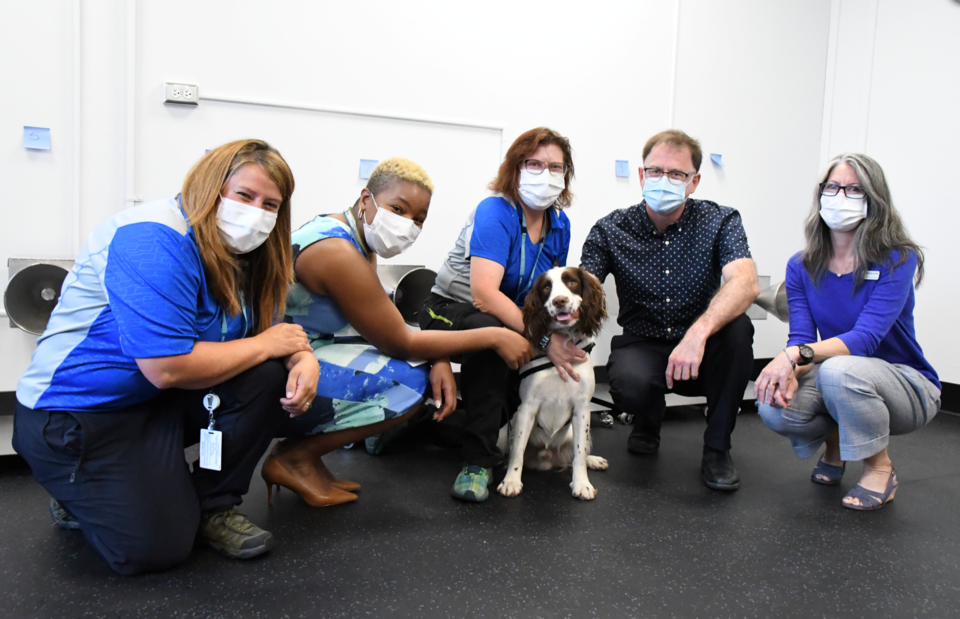Vancouver Coastal Health’s (VCH) canine scent detection team is turning its sights—or rather, its noses—toward COVID-19.
Since it was established in 2016, the health authority’s Canines for Care program has worked to sniff out the potentially-harmful Clostridioides difficile (C. difficile) bacteria in hospital settings. VCH announced on Thursday that the program has now added three new dogs to its roster that are specifically trained to detect the COVID-19 virus through smell.
The program is now building on its foundation with C. difficile to see what role this canine scent detection team can play in “enhancing COVID-19 screening” measures to support the country’s safe reopening.
The multidisciplinary team embarked on this journey seven months ago, after hearing about colleagues in other countries who had launched research projects into the topic, Dr. Marthe Charles, head of VCH’s Division of Medical Microbiology and Infection Prevention, told Pique.
Unlike some of these other programs, Canines for Care “also had the responsibility to look after patients and staff—the beginning of the pandemic was very busy, for our team,” added Teresa Zurberg, a canine scent detection specialist and nationally recognized dog handler.
“It took us a while, and we wanted to see what the other international colleagues of ours were doing and what their thoughts were. But once we started in January, we jumped in with all four paws, so to speak, and started training dogs and seeing what we could do and what we could figure out.”
But even with the team’s prior experience, training dogs to detect a relatively new virus is no small feat. The Canines for Care team started from scratch, initially identifying three “green” dogs who appeared to be suitable candidates for the job.
“Every dog can sniff, but not every dog can work,” Zurberg said. “We need dogs that are obsessed with going to work, so they'll work no matter what environment they're placed in.”
The team selected dogs that are specifically bred and genetically disposed to hunt, “which makes our lives a lot easier,” she added.
“Any detection work—whether you're looking at bomb dogs, drug dogs or COVID dogs—is a game to the dog,” Zurberg contined. Researchers create a game of association where the dogs “learn that if they find and indicate to us the target odour that we've chosen for them, they get what they really want—that's their food or their toy. It's just a big game and the dogs love to play it.”
A third-party reviewer recently certified two Labrador retrievers, Micro and Yoki, and one English springer spaniel, Finn, for COVID-19 scent detection. Micro and Finn were found to have 100 per cent sensitivity and 93 per cent specificity in identifying COVID-19 in a laboratory setting. Yoki, the third dog to go through COVID-19 scent detection training, passed the rigorous validation process with similar results, VCH said.
As it becomes clearer that the virus isn’t going anywhere anytime soon (despite a high number of fully vaccinated residents, Canada’s top doctor announced Thursday that the country is now in the midst of a fourth wave of the pandemic) the dogs will soon begin using their skills to help catch and prevent any COVID-19 infections.
Though the health authority identified screening in airports, on cruise ships and at public events as possible applications of COVID-19 canine scent detection, exactly where and how the dogs’ skills will be applied is yet to be determined.
“We’re only limited by our imagination as to how to best deploy our dogs, and that's what we're working with in partnership with Health Canada to figure out,” said Zurberg.
During the training process, researchers—including Charles—travelled throughout the health authority to voluntarily collect nearly 1,000 samples from potential COVID-19 patients in Whistler and beyond.
“We had samples coming from people that were in hospital, but we also had [samples from] people that were hoping to go down the slopes,” Charles said. The team collected gargle, breath and sweat samples from a variety of people—ranging from those who were mildly symptomatic, like many of the people getting tested in Whistler, to COVID-19 patients in long-term care—in order to present the dogs with an array of odours. The only population Charles and her team did not collect samples from were patients in intensive-care units, she said.
So, how willing were people to offer up samples for the canine team?
“I was pretty transparent by telling them that we were trying to see if all of those studies that were coming out from different parts of Europe were true, and we wanted to do a proof of concept,” said Charles. “I feel like people in 小蓝视频, the moment you tell them that there are dogs involved, they really want to help.”
The program is funded in part by Health Canada through its Safe Restart Agreement Contribution Program, as well as the Vancouver General Hospital and University of British Columbia Hospital Foundation.




